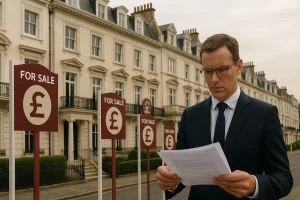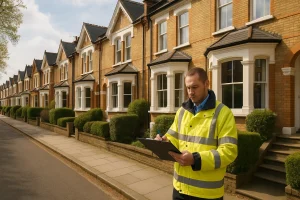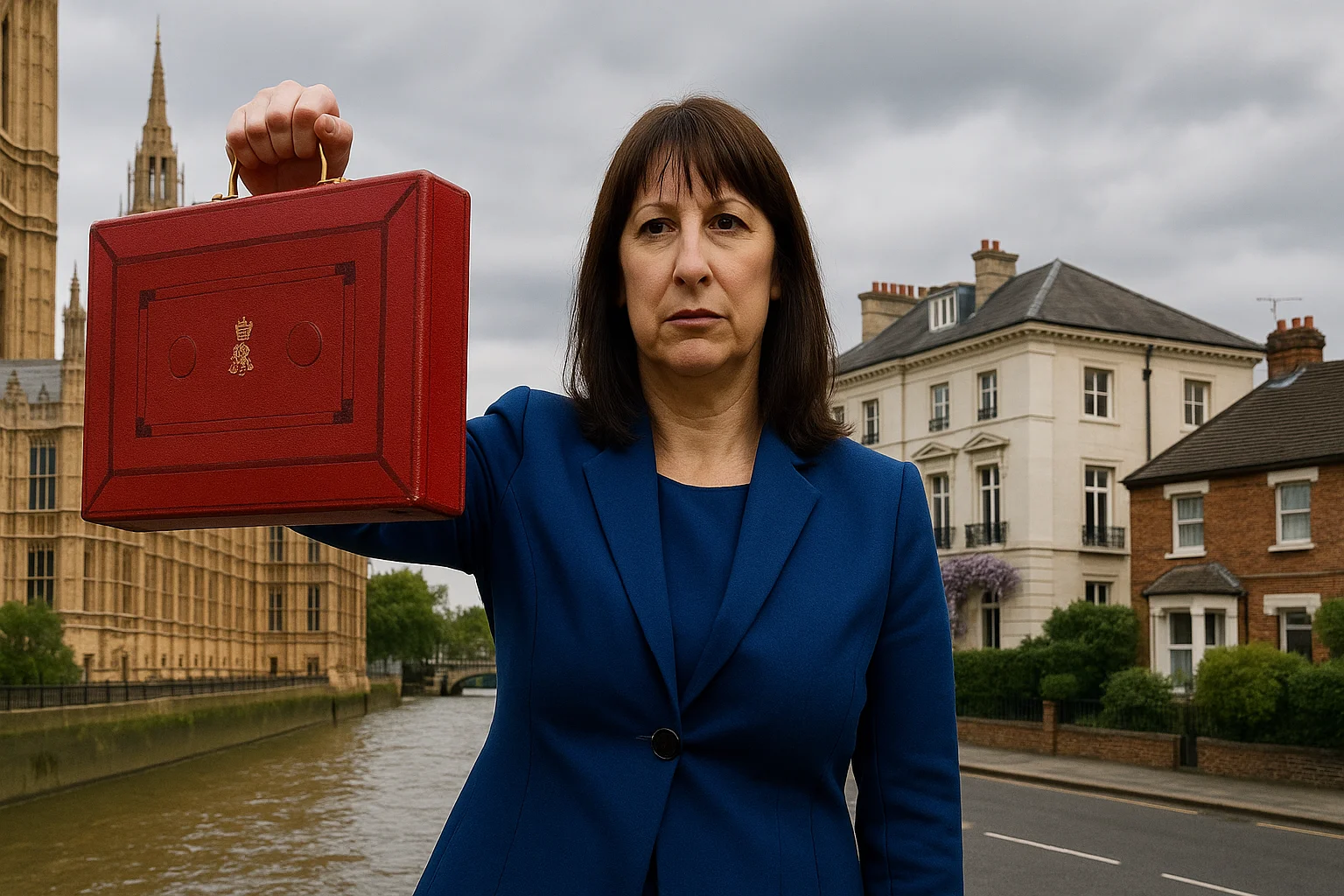For many families in the UK, home ownership is more than just a place to live. It’s a legacy, a source of pride, and often the largest financial asset they’ll ever possess. But recent headlines about a so-called “back door death tax” proposed by Chancellor Rachel Reeves have sparked anxiety across the nation.
With whispers of a £600 million property levy and plans to hit asset-rich but cash-poor homeowners, especially pensioners, the question isn’t just about policy anymore – it’s about fairness, financial futures, and family legacies.
This blog takes an in-depth look at Rachel Reeves’ controversial tax strategy and what it could mean for millions of UK households in 2025 and beyond.
Why Is Rachel Reeves Accused of Introducing a Back Door Death Tax?
The term “back door death tax” has emerged from the mounting criticism surrounding Reeves’ proposal to reform property taxation under the upcoming Autumn Budget.
At the centre of the controversy lies a plan to implement a form of mansion tax that would be levied on high-value homes, but with a twist: payment could be deferred until the property is sold or until the homeowner dies.
This has ignited concerns that such a structure would effectively serve as an inheritance tax in disguise.
Rachel Reeves, the Chancellor, is said to be considering a £600 million annual levy that targets the top 10% of residential properties in England particularly those falling into council tax bands F, G and H. According to government estimates, this involves around 2.4 million homes. While this may sound like a selective move, the financial implications are far-reaching.
Critics argue that:
- The deferred payment model aligns with traditional inheritance tax mechanics, as the burden passes onto the heirs.
- Families could end up paying two layers of tax when a loved one dies the existing 40% inheritance tax plus the new property-based surcharge.
- It risks forcing grieving families to liquidate properties to settle tax obligations.
In political circles, Conservative Leader Kemi Badenoch has condemned the move as “a mansion tax payable on death”, calling it an “unjustified raid” on pensioners who have “done the right thing” throughout their lives.
What Is the Proposed Mansion Tax and Who Will It Affect?

At the heart of Reeves’ fiscal strategy is a reformed mansion tax based on a comprehensive revaluation of high-value homes. This proposal centres on properties currently listed in bands F to H of the council tax system.
Scope of Affected Properties
| Property Band | Estimated No. of Homes Affected | Current Value Range (Approx.) |
| Band F | 1.3 million | £320,000 – £424,000 |
| Band G | 800,000 | £424,000 – £520,000 |
| Band H | 300,000 | £520,000+ |
These properties will be reassessed, and a new surcharge added. The government plans to use the existing council tax framework to apply this charge, but with new calculations based on updated valuations.
Who Will Feel the Impact?
- Middle-class families living in homes that have appreciated in value over the years.
- Pensioners who are asset-rich but have limited income streams.
- Heirs who may face larger tax bills when inheriting property.
This move comes after Reeves abandoned a controversial plan to raise income taxes, choosing instead to raise funds through what many are calling stealth taxation measures.
How Does the Rachel Reeves Back Door Death Tax Impact Inheritance?
The most contentious aspect of this proposal is its long-term implication on inheritance. Many fear that the deferred nature of the mansion tax makes it indistinguishable from traditional inheritance duties.
When a property owner defers payment of the new charge, the liability doesn’t vanish it grows. Upon death or sale, this deferred amount, potentially compounded with interest, must be settled before the estate can be passed down.
Inheritance Tax Comparison
| Tax Type | Rate | Trigger | Payable By |
| Inheritance Tax | 40% | On estates over £325,000 | Estate/Heirs |
| Reeves’ Property Levy | TBD + interest | Upon sale or death | Homeowners/Heirs |
This layering of obligations means that families may not only lose a portion of the estate to inheritance tax but also face an additional, significant bill related to the property levy.
Heirs could be forced to sell the family home to meet tax demands, diminishing the value of passed-down wealth and altering long-standing financial planning strategies.
Will Pensioners Be Forced to Sell Their Homes Under These Plans?

One of the major criticisms against Rachel Reeves’ tax proposal is its potential impact on elderly homeowners who are house-rich but income-poor. Known as the “asset-rich, cash-poor”, many pensioners fall into this category due to years of rising property values but limited access to disposable income.
Key Concerns for Pensioners
- They may not afford the new property tax annually.
- The deferred model provides temporary relief but accumulates over time.
- Interest added to deferred payments could lead to mounting debts.
Stuart Adam from the Institute for Fiscal Studies supports the idea of allowing deferral with interest, similar to a commercial loan, to avoid burdening pensioners. However, not everyone sees this as a fair solution.
From a practical standpoint, these households might be left with two options: either sell their property while alive to avoid growing debt or pass it on with a reduced estate value, eroding decades of wealth accumulation.
How Does This Differ from Traditional Inheritance Tax?
While the back door death tax may appear similar to an inheritance tax, there are critical differences in how and when the charges apply.
Key Differences
| Feature | Inheritance Tax | Rachel Reeves’ Property Levy |
| When it’s applied | Upon death | At death or upon sale (deferred) |
| Who pays it | Estate or heirs | Homeowners or heirs |
| Rate | Fixed 40% (above threshold) | Not fixed; based on property band |
| Basis for calculation | Total estate value | Property value + interest if deferred |
Although Reeves insists this is not a death tax in its traditional form, the financial outcome could mirror inheritance tax burdens for many families, especially when both apply.
Is It Fair to Target High-Value Properties Through Council Tax Changes?

This question cuts to the core of the ethical debate. On paper, the mansion tax aims to increase fairness by asking wealthier property owners to contribute more. However, critics argue the measure is far from equitable.
Points Supporting the Proposal
- Higher-value homes have largely escaped updated taxation due to outdated council tax banding.
- Wealth accumulation in property should contribute more to the national budget.
Counterarguments
- Property does not always equate to liquidity; many homeowners can’t afford sudden tax hikes.
- Middle-class families who bought modest homes decades ago now face high valuations.
- Regional disparities mean that the same home value has different meanings in London vs other parts of the UK.
This could deepen the north-south divide and penalise families purely based on where they live.
What Are Experts Saying About the Mansion Tax and Deferral Options?
Leading economists and policy analysts are split on the approach. The Institute for Fiscal Studies (IFS) supports deferral with interest, positioning it as a viable way to modernise council tax without causing immediate harm.
Key Takeaways from IFS
- A deferral system allows flexibility for low-income homeowners.
- Interest should be charged to protect revenue from inflation erosion.
- The scheme must be carefully structured to avoid encouraging unnecessary deferrals.
Others, including opposition politicians and reformist voices, argue that it’s simply taxation under a misleading label. They contend that the strategy erodes public trust by hiding the real intent. raising money from property-owning families without admitting to it openly.
Could the Rachel Reeves Back Door Death Tax Lead to More Families Paying Double?

Yes, the combination of existing inheritance tax and the proposed property levy could result in dual taxation.
A typical scenario could involve:
- A pensioner passes away, leaving behind a home worth £650,000.
- The estate pays 40% inheritance tax on the portion exceeding £325,000.
- The new property tax, previously deferred, is also triggered, possibly with accumulated interest.
This double hit might leave surviving family members with a significantly smaller estate than expected.
Example Calculation (Hypothetical)
| Scenario | Amount |
| Home Value | £650,000 |
| Inheritance Tax (40% on £325,000) | £130,000 |
| Property Levy (Assume £2,500/year *10) | £25,000 |
| Interest on Deferred Levy (approx.) | £5,000 |
| Total Tax Burden | £160,000 |
This kind of financial outcome has raised serious concerns among families already struggling with the rising cost of living.
Why Has Rachel Reeves Abandoned Income Tax Rises in Favour of Stealth Taxes?
Initially, Rachel Reeves had signalled plans to raise income tax to bridge the budget shortfall. However, the political fallout from this proposal, including backlash from both voters and fellow MPs, forced a change in direction.
Instead of direct tax hikes, Reeves opted for:
- Freezing income tax thresholds until 2028 (fiscal drag)
- Reforming council tax on high-value homes
- Targeting private pensions and savings allowances
Stealth taxes like the back door death tax avoid direct confrontation with voters but still extract significant revenue. By keeping headline tax rates the same while expanding the taxable base, the Treasury gains financial ground without appearing to break manifesto pledges.
What Are the Political and Economic Implications of This Tax Strategy?

Politically, the proposal has divided opinion. Supporters argue it is a necessary evolution in a system that under-taxes property. Critics see it as a betrayal of promises not to raise taxes on working people.
Economically, the outcome is still uncertain. The plan may:
- Generate up to £600 million annually
- Affect investment confidence among property owners
- Push families into unplanned sales of inherited property
Market reactions to Reeves’ earlier U-turns, particularly around income tax, have already caused volatility in gilts and currency values. The upcoming Autumn Budget will be closely watched by economists and voters alike to see how these policies are implemented.
Conclusion
Rachel Reeves’ proposed mansion tax, now labelled by critics as a “back door death tax”, presents a significant shift in the UK’s fiscal approach. While positioned as a progressive move to ensure the wealthiest contribute fairly, its deferred nature and potential to overlap with inheritance tax have made it a lightning rod for criticism.
For families across the UK, especially pensioners and middle-income homeowners, the implications are real and immediate. Whether it results in forced property sales, double taxation, or reduced inheritances, one thing is clear: this is not just a policy debate. It’s a matter that could redefine generational wealth and economic fairness in the UK for years to come.
FAQs
What is Rachel Reeves’ proposed mansion tax?
It is a levy on high-value properties in England that allows deferred payment until the property is sold or inherited, affecting bands F, G and H.
How does this differ from inheritance tax?
While inheritance tax is charged on an entire estate above a threshold, Reeves’ tax targets property and may also apply upon death, potentially leading to double taxation.
Will pensioners have to pay immediately?
No, the tax can be deferred, especially for those who are asset-rich but have limited income, although interest may apply on the deferred amount.
How many homes could be revalued?
Around 2.4 million properties, which is about one in ten English homes, are expected to undergo revaluation under these plans.
Is this policy replacing an income tax rise?
Yes, after abandoning income tax hikes due to political pressure, the Chancellor has turned to stealth taxes like this property levy to raise funds.
Could this tax affect middle-class families?
Yes, especially those living in homes that have increased in value but do not have large incomes to manage new charges.
Will this tax apply to all properties?
No, it targets higher-value homes in specific council tax bands, not all UK properties.




